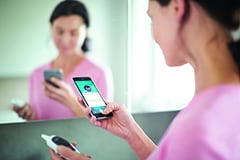It’s the age of the ‘on demand’ consumer and industries such as retail, hospitality, media, government and education have all undergone a sharp and drastic period of change led by digital innovations.
“Is bronchitis contagious?” and “How many calories should I eat” were both top Google health searches between January and November of 2015. In fact, around 1 in 20 Google searches were health-related and there were more than 3 billion downloads of mHealth apps (estimated by the main app stores) in 2015 also, allowing people to self-monitor disease conditions and adjust their lifestyles.
And healthcare is changing too. The appetite for digital services is growing along with the need for reliable information.
“Gradually, we are becoming empowered to know more about our own health – and act on it.”
Understanding the challenges
Does healthcare understand this shift? Communication with friends and family is fast and frictionless today; people can do business, shop and put themselves through a university degree course online. They can now manage their finances seamlessly via phone apps; using virtual reality they can visit and examine the world’s most famous artworks.
“Soon, they will ask why healthcare isn’t being delivered the same way.”
These are big challenges for an industry negotiating digital change and it is not a unique problem.
From one perspective, the challenges embedded in the industry are broad and deep, and the limitations revolve around access to and free movement of data. Medical information is sensitive and often struggles to flow around the complicated and tangled bureaucracies constructed around healthcare services in many countries.
This lack of access to data and poor care co-ordination has worked to the detriment of patients and has inhibited health outcomes. For example, according to the Future Health Index1 – a survey of 25,000 patients which was commissioned by Philips – despite steady progress towards universal medical records, a vast majority of patients still have to repeat the same basic information to multiple healthcare professionals. Most say they have also experienced repeatedly taking the same tests, delaying treatments and burning up valuable time.
As a result, streaming services are now a vital part of all traditional broadcasters’ online offerings. Whole industries have been transformed by the ‘on demand’ consumer and quickly overtaken by innovations. People can now rent out their own homes to visitors as opposed to taking the traditional route and booking a hotel or a bed and breakfast. Airbnb tapped into consumer appetite for different experiences and more personalized accommodation anywhere in the world and as a result disrupted the hospitality industry. I am not suggesting that healthcare is standing still. Research suggests consumers want more connected healthcare. Over half (57%) of patients surveyed for the Future Health Index (aged 18-34) said they owned or used at least one health monitoring device, with 71% saying they would be interested in scheduling appointments online and 66% interested in receiving medical test results online.
Where will healthcare go next?
The research also highlighted some fault lines: around 74% of patients actively managed their own health but 75% of doctors thought patients needed to take a more active role. There’s an obvious disconnect between what people think they are doing and what doctors are observing.
Empowering consumers to engage in their health and take control of their lifestyle choices is precisely what Philips’ connected personal health programs do. Data accrued from connected devices which monitor patients, sensors in hospital rooms, wearables and lab equipment will ultimately transform healthcare in a huge way and usher in a new era of care delivery, reducing costs and saving time.
Data from our connected health devices – such as Philips’ health watch, digital blood pressure monitors and body analysis scale – supports the small lifestyle changes that make a big difference.
“Soon consumers will want to access their lab results via their smart phones within minutes of leaving a medical center; they will want their data to be accessed on multiple devices and freely exchangeable, and they will want healthcare delivered from the comfort of their own homes.”
And as care delivery moves that way, consumers will finally be able to add real-time, connected healthcare to the other digital services they now take for granted and use every day.
[1] More than 2,600 healthcare professionals and 25,000 patients were questioned in Australia, Brazil, China, France, Germany, Japan, The Netherlands, Singapore, South Africa, Sweden, UAE, UK and US.
Related articles
The author
About
Innovation Matters delivers news, opinions and features about healthcare, and is focused on the professionals who work within the industry, as well as Philips as a cutting-edge health technology organization. From interviews with industry giants to how-to guides and features powered by Philips data, our goal is to deliver interesting, educational and entertaining content to empower and inspire all those who work in healthcare or related industries.
Contact innovationmatters@philips.com



